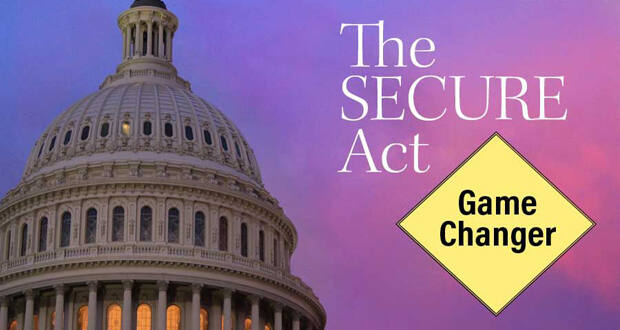The new $15.7 billion tax on retirement accounts

We have a saying around our office that retirees are one of the highest and most unfairly taxed groups out there and with the recent passage of the SECURE Act things are getting worse for retirement accounts. With most individuals having either their retirement account or their home as the largest chunk of their net worth it makes perfect sense why the federal government would target taxation on retirement accounts. With the largest transfer of wealth from one generation to another set to begin ramping up with baby boomers aging, the government has decided that they would like a larger share of that by recently passing the SECURE Act.

The largest source of increased taxation in the new SECURE Act is a provision requiring non-spouse beneficiaries to completely withdraw and pay taxes on all tax deferred retirement accounts (like 401(k)s, 403(bs), TSPs, IRAs, etc.) within 10 years. There are a few exceptions to this, which we will discuss next month. Under previous tax law beneficiaries could stretch withdrawals over their entire lifetimes instead of the much shorter 10-year time period. What this means is the larger the balance you have in your retirement account, the more likely the IRS will become one of the largest beneficiaries of it. For example, if you had a retirement account worth $1 million and you have a single child as your beneficiary. Your child would be forced to withdrawal and pay taxes on $1 million within 10 years. If they earned 0% interest on the inherited money the most they could spread this out is $100,000 a year for 10 years. Typically, if you add a sum as large as $100,000 to your tax return you will jump into a much higher tax bracket. Under the old law where a beneficiary only had to take out a much smaller amount jumping one or multiple tax brackets higher would rarely occur. The Congressional Research Service estimates that beneficiaries will pay an additional $15.7 billion in taxes over just the next decade alone because of this change.
For those that have a trust as a beneficiary on their retirement account things can be dramatically amplified since trusts and estates hit the highest tax bracket the fastest. At just $12,951 the tax starts to be a whopping 42.7% (37% federal tax and 5.7% in state taxes in Kansas). What this means is that if you had a beneficiary with a trust that is taking out $100,000 a year like in the above example, $87,050 of that withdrawal each year will be taxed at the highest tax bracket rate of 42.7%. If you have a poorly written trust that tax could apply to nearly all $1 million all at once too. Nearly every trust written prior to 2020 should be reviewed and revised to prevent this scenario from potentially playing out. Some of the best written trusts in the past may now be a tax disaster moving forward.
There are many changes being brought about by the SECURE Act besides just this tax increase. We will be diving more into those changes in future articles. Next month we’ll go over some ways to offset, reduce, or possibly eliminate this tax from occurring to your retirement account. The more money you have saved in a retirement account, the more important revising your tax plan and estate plan has become. Those with a net worth over $1 million or retirement account assets over $300,000 should seek out professional help on how to reduce the negative tax impact the SECURE Act will have on a sooner rather than later basis. This type of advanced tax and estate planning is something we do as part of our 3 Step Review for new clients. There’s no reason to make the IRS the biggest beneficiary of your retirement accounts when you can often do several simple and easy things on the front end to prevent it.
–Ryan Shumaker, Smartvester Pro at The Retirement Team; Ryan can be contacted at 785-228-0222 or RetireTopeka.com.
Material discussed is meant for general/informational purposes and is not intended to be used as the sole basis for any financial decisions, nor be construed as advice to meet your particular needs. Please consult a financial professional for further information.
Investment advisory services offered through Next Generation Investing, LLC.
Securities offered through World Equity Group, Inc. member FINRA and SIPC.
Next Generation Investing, LLC, & The Retirement Team are not owned or controlled by World Equity Group.
Insurance and annuities offered through Ryan Shumaker, KS Insurance License #10359614.
READ: The stock market in election years: should you be worried?








